updated 12/07/2019
![]()
updated 12/07/2019
Korean Conflict Honor Roll 1950-1957 |
This Honor Roll is a compilation of men and women from Allamakee county who served in the Korean conflict. It is an on-going project - and you can help! Do you have a photo or notes to add for any of these soldiers? Additional names? Help honor our Korean war veterans. Send to the Allamakee co. coordinator for inclusion on this page.Sources used to compile the Honor Roll are gravestone inscriptions, obituaries, newspaper articles & researcher-contributed records.
| Bareis, Arthur John, Postville; U.S. Army. Obituary | ||
Baxter, Donald T.,
Allamakee Co. Iowa; Corporal, Army; died December 1,
1950*. Obituary & photo
|
||
| Baxter, Gerald W., Atlantic, IA/Waukon; U.S. Air Force. Obituary | ||
| Benedict, Percy E., Waukon; U.S. Air Force, electronic counter-measures. Obituary | ||
| Beneke, Alvin G., New Albin; U.S. Army. Obituary | ||
| Breezer, Ed, New Albin, U.S. Army | ||
| Brennan, Donald G., Waukon; Sergeant, U.S. Air Force. Obituary | ||
| Broderick, William E., Lansing; U.S. Army. Obituary | ||
| Buntrock, John H., Waukon; U.S. Army, stationed in Germany during the Korean conflict. Obituary | ||
| Casten, Leslie Arthur, Caledonia, MN / New Albin; Airman First Class, U.S. Air Force; Awards: National Defense Service Medal, Korean Occupation Medal, Good Conduct Medal and Overseas Service Ribbon; Died July 22, 1955, just seven days before he was to be released from active duty. Obituary & photo | ||
| Curran, Raymond L., Lansing/Waukon; U.S. Navy. Obituary & photo | ||
Darling, Thomas,
New Albin; U.S. Army
|
||
| Gilson, Dale, Postville. Obituary | ||
| Gleisner, William Clark, Waukon; U.S. Army. Obituary & photo | ||
| Hove, Gary L., Waukon/Decorah; U.S. Army. Obituary & photo | ||
Jordan, Sigurd A.,
New Albin; Aviation Cadet
|
||
| Meyer, Cloy Frederick, Castalia/Postville; U.S. Army. Obituary | ||
| Mullarkey, Francis J. 'Frank', Lansing & McGregor; U.S. Navy and U.S. Army. Wounded in Korean war. Obituary | ||
| Reeder, Dale, Waukon; Coporal, U.S. Army; POW. Obituary * Much more about Dale & photos | ||
| Schroeder, Norman Alan, Postville; U.S. Navy, 1953-1956; served in the Pacific during the war. Obituary | ||
| Tepesch, Francis W. 'Bill', Waukon; Corporal, U.S. Army Air Force; 529th Signal Corps, Japan, Guam & the Philippines. Obituary | ||
Thimmesch, Leo, New Albin; U.S. Air
Force.
|
||
Thimmesch, Robert
Henry 'Bob', New Albin; U.S. Marine Corps,
Sergeant.
|
||
| Tobin, Donald J. 'Red', U.S. Army 1952-1955. One assignments was with the 60th Anti-aircraft Artillery Battalion. Obituary | ||
| Vickery, Roy Martin,
CPL, Co C, 2nd Engineer Combat Battalion, 2nd Infantry
Division, Submarine mine planter; captured 12/01/1950
near Kunu-ri, North Korea. He died in a Communist
Prisoner of War Camp in Korea, February 20, 1951.
According to the website Military
Times - Hall of Valor, his remains were never
recovered. Awards: Purple Heart, Prisoner of War Medal,
Korean Service Medal, United Nations Service Medal,
National Defense Service Medal, Korean Presidential Unit
Citation and the Republic of Korea War Service Meda. Newspaper article, biography & photo |
||
| Zeimet, Adrian J., U.S. Army; Lansing. Obituary & photo |
~*~*~
First Postville Draftees
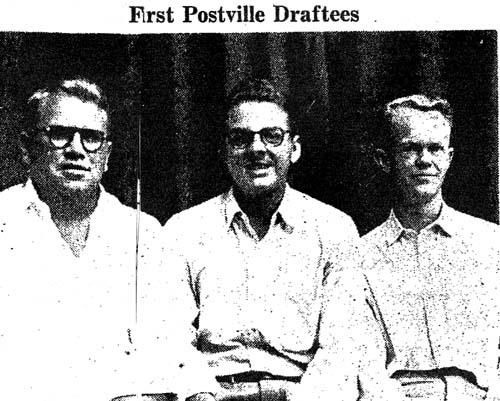
Shown above are the first Postville men who were called to the service under the extended draft act which went into operation after the Korean conflict. Left to right they are: Dale Meyer, Emmett Helgerson and Hall Roberts. They left for induction last Wednesday.
~source: Postville Herald, Wednesday, September 20, 1950
~contributed by Reid R. Johnson
~*~*~
Allamakee co. Inductees
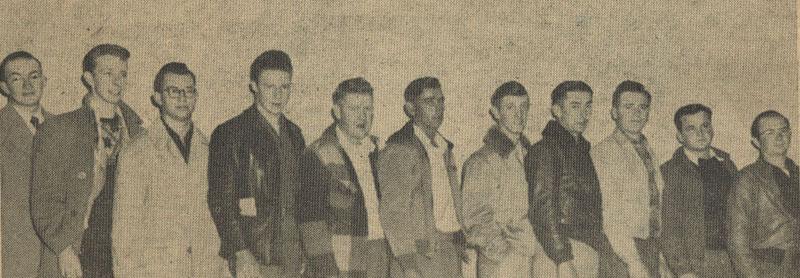
Inductees Leave From County
The third group of inductees to leave from Allamakee county for service in the U.S. armed forces left last Wednesday, Nov. 8. They reported to Des Moines where they were processed and then sent on to training posts for their basic training. The group includes, left to right: Gerald Burke, Dorchester; John Wellendorf, Lansing; Charles Hoth, Postville; Calvin Kostman, Postville; Robert Rose, Monona; Donald Gaulthier, Lansing; Thomas Darling, New Albin; Wilburt Topel, Monona; Edward Breeser, New Albin; Stanley Elingson, Spring Grove, Minn. and Charles Hammon, Waukon. - Waukon Newspapers photo.
~source: undated Waukon newspaper clipping
~contributed by Russel Topel, son of Wilburt Topel
~*~*~
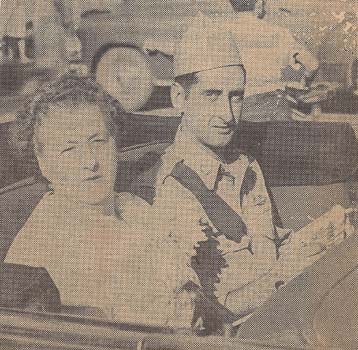
Cpl. Dale Reeder and his mother, Mrs. Vesta Reeder as they came home together Monday afternoon for a big homecoming celebration. Held as prisoner of war in North Korea for 34 months, the corporal will be home 30 days before going to Illinois for separation. - Photo by Waukon Newspapers' Staff Photographer Raymond Osterholm.
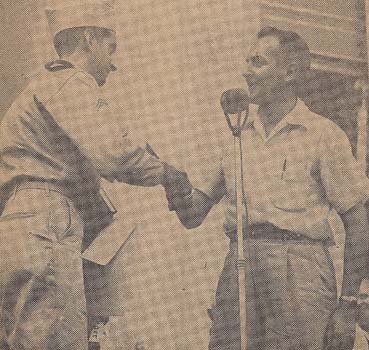 M.A. "Dutch" Jacobi, president of the Waukon chamber of commerce, is shown here as he presented Cpl. Dale Reeder with a wrist watch Monday afternoon during the homecoming celebration given the one-time prisoner of war. - Picture by Staff Photographer, Raymond Osterholm. |
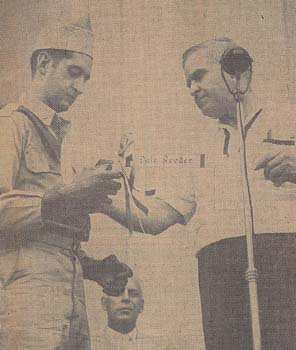 "This key to the city," said Mayor Albert Oelberg to Cpl. Dale Reeder Monday, "is really the key to the hearts of home town folks." The key was presented during the Monday afternoon homecoming celebration for the corporal who celebrated his twenty-fifth birthday by being released from a Korean prison camp. - Picture by Staff Photographer, Raymond Osterholm. |
~Waukon Democrat, Sept. 1953 (above 3
photos & captions)
~contributed by Errin Wilker
~*~
“Preserve American Way - At All Costs", says Reeder
Corporal Dale Reeder
Anyone who has come to take the American way of life for granted in any smallest detail should talk to Cpl. Dale Reeder, who was welcomed home August 31 after spending three years as a prisoner of war in North Korea. To the corporal who came through his ordeal remarkably well, the American way of life is very important, and it must be preserved at all costs. Respect for American freedom to worship, to live and to maintain a way of life seems to the 25-year old corporal something that everyone has to learn to protect. Insidious attacks are being made by the Communists, Reeder believes, and it is the duty of every honest American to protect the American way by being on the alert against these attacks by every possible means.
Thirty-four months a prisoner of war at Camp No. 5 in North Korea, a few hundred yards from the Manchurian border, Reeder is well aware of the true nature of communistic propaganda. He and another American soldier were taken prisoner together with many others over a wide area. The prisoners were taken into Camp No. 5 at Pykodong which lies in rough country, where winters are cold and summers hot and uncomfortable. The camp was near the Yalu river where the prisoners could see Chinese peasants moving about from time to time.
The camp was in a North Korean compound and little had been done to it to make it into a prison camp. There was no fence or stockade, but a ring of guards surrounded the camp at all times. The men were housed in shed-like barracks, where they had to sleep on the floor, at first without blankets. Wood was issued occasionally, on the basis of so much wood per man, not on the basis of what size of building had to be heated. Although wood was not issued often, there were stoves in which to burn it when it was available. Otherwise, Reeder said, it was possible to keep warm only because there were so many men in the crowded barracks.
Six companies were kept at the camp, and Reeder was in the smallest company, of 180 men. Morning and evening, daily, the men were issued field corn which they could cook in plain water in large metal pots. No other food was issued at first, and for a beverage the men could prepare a concoction of roasted barley which made a colored watery drink, supposed to be like coffee. "After prisoner of war lists were beginning to be published," said Reeder, "the prisoners were treated slightly better." This "better" treatment, however, was not very good, for the first additions to the daily ration were cooked rice and moldy meat. It was late in 1951 before this slight improvement in the diet took place.
All night long the prisoners of war were kept on the march. In the morning, food was issued to the squads, and the men were permitted to prepare it for themselves, but since it was usually only dry corn and water, it was not very attractive fare. All day the prisoners were kept indoors, so they could not be seen by any chance passing planes. The days were dull, as no recreation of any kind was provided, and there was little the men could do to keep up their morale.
The day’s schedule included one to three hours of communist propaganda lectures, to which the men were obliged to pay strict attention. Men whose listening was noticeably inattentive were thrown into a pit for punishment. Some were beaten for “insubordination," which could be of the very slightest nature.
Chinese communist guards, at least one English-speaking man to a company, watched the prisoners constantly. After the lectures the prisoners were shut up in their barracks and told to "discuss" the subject matter of the lectures, all of which was communist propaganda. Anyone who failed to do so was punished, and the English-speaking guards, standing close at hand, listened to every word that was said, so there was no alternative for prisoners.
As soon as they were taken prisoner, American soldiers were relieved of their uniforms and gear and issued light summer prisoner uniforms of light blue cotton and soft canvas shoes. For winter they were issued padded Chinese uniforms, and, after a time, each man was given a blanket, but many months passed before they had blankets at all.
On Chinese holidays the men got six or so cigarettes each, otherwise there was no tobacco. There was no reading material with exception of a few communist propaganda pamphlets printed in English, and the men had absolutely no access to radio communications of any kind. News was given out by English speaking Chinese communist guards, but Reeder said it was all highly colored by communist propaganda, and no one believed much of what was given out. At the time of the armistice proceedings news was given out, but America was always discredited as much as possible in the reports.
As a result of poor food, over- crowding, all-night marching, uncertainty and bad treatment the Americans held in Camp No. 5 were often ill, Reeder said. There was no medical care, but a few first aid kids were on hand, and in time there were a few medical supplies, late in the prison term. At one time Reeder suffered from dysentery for three months at a stretch and nothing was done for him. All the men suffered from colds, flu and minor infections most of the time, and the seriously sick were taken to a separate barracks where at first the death rate was very high. Later, with better medicines and food, the death rate did drop, but at no time was medical care available, and health conditions in the camp were uniformly bad.
Three times a month the men could write letters, and this meant they were issued three sheets of paper. Some of the men wrote no letters at all, so writers were able to get a little more paper by trade, but even letter-writing was circumscribed.
Sometimes the prisoners were ordered to put communist propaganda slogans on the envelopes in which their letters were to be mailed, and rather than do so many did not send letters if so ordered. For a time, the men kept notebooks and diaries, but after the guards noticed it they took all such material and destroyed it. When the prisoners left their camp they had no personal belongings whatsoever.
The communists took many pictures—whenever a little extra food (especially meat of dubious origin) was added to the ration, they took pictures to try to show “how well” they were treating the prisoners. Likewise they took pictures of religious services held in the camps—although there were no chaplains for the men, and whatever religious services they had were those arranged by the prisoners themselves.
Each squad was issued an old-fashioned straight-edge razor, said Reeder, and one of the men would try to shave and trim hair for the whole group. Reeder said the prisoners believed that hair cutting and shaving was permitted chiefly for the purpose of the pictures the communists were always snapping. “They wanted us to look as good as possible for propaganda reasons,” Reeder said, “no matter how we were being treated.”
After the prisoner of war exchange was announced, the prisoners were given a biased account of the matter, and transported by truck and box car to Panmunjom. They spent four days at a Chinese post in this vicinity, before being taken by helicopter to Freedom village. On Aug. 5 the second prisoner group, of which Reeder was a member, left Inchong harbor, spending a couple of days on the Gen. Haase in the harbor before going to sea for two weeks.
Arriving in San Francisco in late afternoon, the men were taken at once to a service men’s club where they were treated to thick steaks and welcomed back to the states. At midnight that night, Reeder boarded the plane which brought him into Waterloo Sunday afternoon, and by Monday he was back on Main street again. Reeder is on 30-day leave now, and reports Oct. 2 at Fort Sheridan, Ill., for separation. He will collect back pay for his time as a prisoner of war, and will be able to attend school on GI rights. Always interested in art, Reeder would like to go into design, and is considering plans for his education now. He hopes to complete a college course.
Reeder, although thin, looks comparatively well at the end of his prison ordeal. He has gained 14 pounds since he left the camp. At one time, while camp conditions were at their worst, Reeder got down to 90-odd pounds. “I didn’t eat any more of the food in camp than I just had to," Reeder admitted. "I figured it wasn’t fit to eat and I’d take only enough of it to keep me going." Considering the fact that "pork soup," made of doubtful fat meat and rice, was about the most lavish offering the men had, and that other menus were far, far more unpalatable, one can see that a prisoner did well to keep alive at all. "I never want to eat rice again," Reeder reported with feeling when he came to the newspapers for an interview yesterday.
And with his mother, Mrs. Vesta Reeder and everybody else in Waukon welcoming him home it looks as if it would be a long time before anybody would make him eat anything he didn’t want to. It’s apple pie and fried chicken time in Iowa, and even plain bread and butter tastes wonderful to one who has 34 months of prison fare to forget.
~Waukon Democrat, Waukon, IA, Sept. 1953 (article & accompanying photo are from a different issue of the paper than the 1st 3 photos & captions)
~contributed by Errin Wilker
~*~
Reeder Gives Veterans Day Address
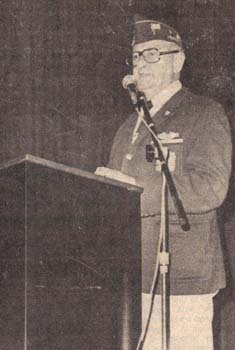
A large crowd gathered in the Kee High gymnasium for the school’s traditional Veterans Day program on Nov. 11. Following the processional selection, “American Spirit March,” the Lansing Legion post 50 and New Albin VFW post 5603 posted the colors. Rev. Milton Kading gave the invocation, followed by the address from Dale Reeder of Waukon, a Korean War veteran who was a prisoner of the Chinese Communists for more than two years.
Reeder gave a lengthy narrative in which he outlined the hardships forced upon him and his fellow soldiers during their imprisonment. The young people, especially, seemed stunned by his revelations on life as a P.O.W. Reeder emphasized that we in America don't realize how lucky we are to have freedom. “You only realize it when you lose it,” he declared.
Following a vocal selection, “Battle Hymn of the Republic,” from the second and third graders, Mrs. Leona Nelson, chaplain of New Albin’s V.F.W. Auxiliary, offered a prayer in keeping with the occasion. Taps were then sounded by Joel Sires of New Albin V.F.W. Rev. Kading offered the benediction and the colors were retired, ending the inside ceremony. The program concluded outside with the traditional salute to the nation’s war dead by the firing squad.
~Allamakee Journal, Lansing, IA, Nov. 1982
~contributed by Errin Wilker
~*~*~
Note: Interested researchers may want to check their libraries for: 25th Infantry Division, Tropic Lightning, Korea, 1950-1952; by 25th Infantry Division, United States, Army Infantry Division, 25th Staff, Army, 25th Infantry Division Association; copyright 2002.
The book lists soldiers from Allamakee county that served during the Korean War.~*~*~